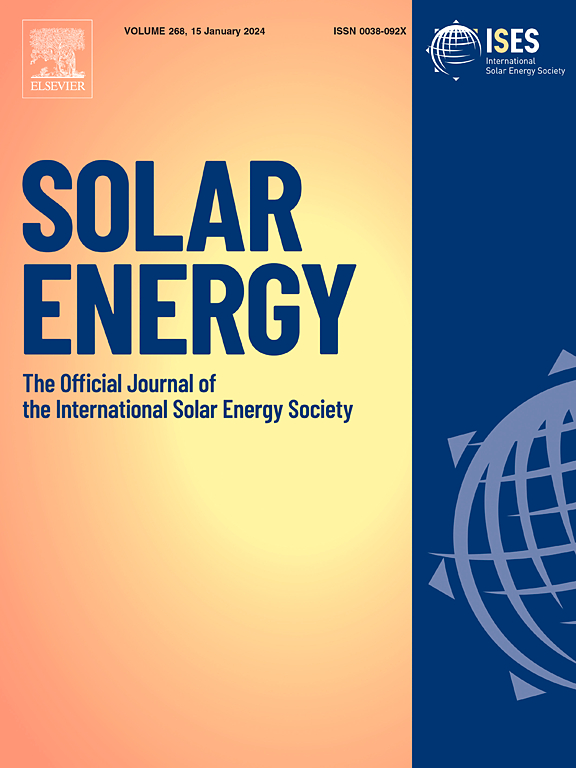利用相变材料、多孔介质和纳米流体提高混合太阳能集热器的光电热(PVT)性能
IF 6
2区 工程技术
Q2 ENERGY & FUELS
引用次数: 0
摘要
本研究提出了一种新颖、低复杂度的冷却系统,旨在提高与混合空气-水太阳能集热器(HAWSC)集成在一起的光伏热(PVT)系统(称为传统 PVT-HAWSC 系统)的性能。该研究解决了这些系统的局限性,如低导热流体出口温度、热放热、热效率、电效率和热功率。为此,研究人员在传统的 PVT-HAWSC 系统中加入了相变材料 (PCM)、多孔介质 (PM)、多壁碳纳米管 (MWCNT) - 水纳米流体,形成了改进型 PVT-HAWSC 系统。改进后的系统采用了带有钢棉-PM 的双通道单导管空气太阳能集热器和集成了石蜡-PCM 的片管水热集热器。在空气、水和纳米流体的不同流速下进行了实验研究。性能分析包括放能、能量、热能和电能评估。结果表明,流体类型和流速对性能有很大影响。使用纳米流体的改良系统可将光伏板表面温度降低 28 °C,而不使用纳米流体时仅为 22 °C。此外,改良系统的总体效率、总热效率和电效率的日均提高率分别为 16.49%、56.25% 和 93.64%,而传统系统的日均提高率分别为 12.80%、43.16% 和 79.90%。改进型系统获得的总热能和日平均放能效率分别为 302.72 瓦和 14.32%,而传统系统分别为 235.4 瓦和 14%。改进后的 PVT-HAWSC 系统的平准化能源成本(LCOE)较低,为 0.043 美元/千瓦时,投资回收期为 4.36 年,减少了 36.55 吨二氧化碳排放,并获得了 529.98 美元的碳信用额度。本文章由计算机程序翻译,如有差异,请以英文原文为准。
Enhancing photovoltaic thermal (PVT) performance with hybrid solar collector using phase change material, porous media, and nanofluid
This study presents a novel and low-complexity cooling system designed to enhance the performance of Photovoltaic Thermal (PVT) systems integrated with a Hybrid Air-Water Solar Collector (HAWSC), termed traditional PVT-HAWSC systems. The research addresses the limitations of these systems, such as low heat transfer fluid outlet temperature, thermal exergy, thermal and electrical efficiencies, and thermal power. This is achieved by incorporating phase change material (PCM), porous media (PM), and multi-walled carbon nanotubes (MWCNT)-water nanofluid into the traditional PVT-HAWSC system, resulting in a modified PVT-HAWSC system. The modified system features a double-pass single-duct air solar collector with steel wool-PM and a sheet-tube water thermal collector integrated with paraffin wax-PCM. Experimental investigations were conducted under varying flow rates of air, water, and nanofluid. The performance analysis included exergy, energy, thermal, and electrical assessments. Results demonstrated that fluid type and flow rate significantly impact performance. The modified system with nanofluid reduced the PV panel surface temperature by 28 °C, compared to 22 °C without nanofluid. Additionally, the average daily improvements in overall efficiency, total thermal efficiency, and electrical efficiency were 16.49 %, 56.25 %, and 93.64 % for the modified system, compared to 12.80 %, 43.16 %, and 79.90 % for the traditional system. Total thermal energy gained and average daily exergy efficiency were 302.72 W and 14.32 % for the modified system, compared to 235.4 W and 14 % for the traditional system. The modified PVT-HAWSC system achieved lower levelized cost of energy (LCOE) of 0.043 $/kWh, a 4.36-year payback, 36.55 tons of CO2 mitigation, and $529.98 in carbon credits.
求助全文
通过发布文献求助,成功后即可免费获取论文全文。
去求助
来源期刊

Solar Energy
工程技术-能源与燃料
CiteScore
13.90
自引率
9.00%
发文量
0
审稿时长
47 days
期刊介绍:
Solar Energy welcomes manuscripts presenting information not previously published in journals on any aspect of solar energy research, development, application, measurement or policy. The term "solar energy" in this context includes the indirect uses such as wind energy and biomass
 求助内容:
求助内容: 应助结果提醒方式:
应助结果提醒方式:


